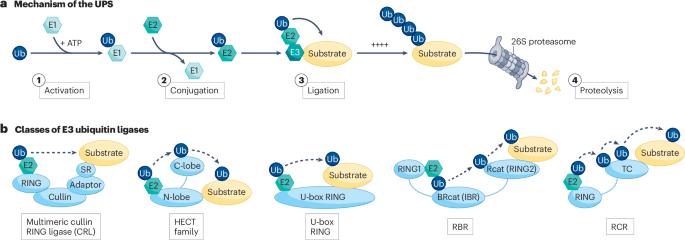Targeted protein degradation for cancer therapy
IF 66.8
1区 医学
Q1 ONCOLOGY
引用次数: 0
Abstract
Targeted protein degradation (TPD) aims at reprogramming the target specificity of the ubiquitin–proteasome system, the major cellular protein disposal machinery, to induce selective ubiquitination and degradation of therapeutically relevant proteins. Since its conception over 20 years ago, TPD has gained a lot of attention mainly due to improvements in the design of bifunctional proteolysis targeting chimeras (PROTACs) and understanding the mechanisms underlying molecular glue degraders. Today, PROTACs are on the verge of a first clinical approval and recent structural and mechanistic insights combined with technological leaps promise to unlock the rational design of protein degraders, following the lead of lenalidomide and related clinically approved analogues. At the same time, the TPD universe is expanding at a record speed with the discovery of novel modalities beyond molecular glue degraders and PROTACs. Here we review the recent progress in the field, focusing on newly discovered degrader modalities, the current state of clinical degrader candidates for cancer therapy and upcoming design approaches. Targeted protein degradation (TPD) is an emerging pharmacological modality in cancer therapy. In this Review, Hinterndorfer et al. outline the mechanistic bases of TPD and discuss the characteristics, advantages and applications of established compounds as well as upcoming classes of degraders.


靶向蛋白降解用于癌症治疗
靶向蛋白质降解(TPD)旨在重新规划泛素-蛋白酶体系统(主要的细胞蛋白质处理机制)的靶标特异性,以诱导选择性泛素化和降解与治疗相关的蛋白质。自 20 多年前提出以来,TPD 已获得广泛关注,这主要归功于双功能蛋白水解靶向嵌合体(PROTACs)设计的改进和对分子胶降解器基本机制的了解。如今,PROTACs 即将首次获得临床批准,最近的结构和机理研究成果与技术飞跃相结合,有望继来那度胺和相关临床批准类似物之后,开启蛋白质降解剂的合理设计。与此同时,随着分子胶降解剂和 PROTACs 之外的新模式的发现,TPD 领域正在以创纪录的速度扩展。在此,我们将回顾该领域的最新进展,重点介绍新发现的降解剂模式、用于癌症治疗的临床候选降解剂现状以及即将推出的设计方法。
本文章由计算机程序翻译,如有差异,请以英文原文为准。
求助全文
约1分钟内获得全文
求助全文
来源期刊

Nature Reviews Cancer
医学-肿瘤学
CiteScore
111.90
自引率
0.40%
发文量
97
审稿时长
6-12 weeks
期刊介绍:
Nature Reviews Cancer, a part of the Nature Reviews portfolio of journals, aims to be the premier source of reviews and commentaries for the scientific communities it serves. The correct abbreviation for abstracting and indexing purposes is Nat. Rev. Cancer. The international standard serial numbers (ISSN) for Nature Reviews Cancer are 1474-175X (print) and 1474-1768 (online). Unlike other journals, Nature Reviews Cancer does not have an external editorial board. Instead, all editorial decisions are made by a team of full-time professional editors who are PhD-level scientists. The journal publishes Research Highlights, Comments, Reviews, and Perspectives relevant to cancer researchers, ensuring that the articles reach the widest possible audience due to their broad scope.
 求助内容:
求助内容: 应助结果提醒方式:
应助结果提醒方式:


